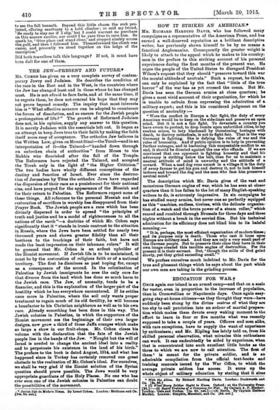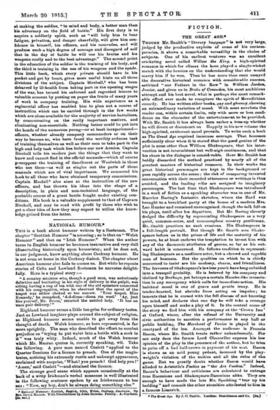EDIICA.TION FOR WAR.j-
ONCE again our island is an armed camp—and that on a scale far vaster, even in proportion to the increase of population, than in Cromwellian or Napoleonic days. Once again easy- going stay-at-home citizens—as they thought they were—hare suddenly been stung by the divine °atria of what they are too shy to call patriotism into an ardour of martial prepara- tion which makes them devote every waking moment to the effort to learn in four or five months what was recently supposed to take a couple of years. Officers and men alike, with rare exceptions, have to supply the want of experience by enthusiasm; and Mr. Kipling has lately told us, from his skilled personal observation, what miracles this enthusiasm can work. It can undoubtedly be aided by experience, when that is concentrated into such excellent little books as the three to which we are now to call attention. The first of them' is meant for the private soldier, and is au admirable compilation from the official text-books and training manuals issued by the War Office, to which the average private seldom has access. It sums up the whole object of military education by stating that it aims • With Ms Am,.. By Richard lisrding Davis. Loudon Duaktorth and Co Ss. (a.] What EOM Soldisr Ought to H..w. Orford as the Ohivarodg Pros. rrd.elo-18?R*PS ** C'r*:e77.11C'6t BlhgaaI;Ite,—L3Bals,l;aiad;
sod Co. [dd. said
at making the soldier, -in mind and body, a better man than his adversary on the field of battle." His first duty is to acquire a soldierly spirit. such as "will help him to bear fatigue, privation, and danger cheerfully, will give him con- fidence in himself, his officers, and his comrade., and will produce such a high degree of courage and disregard of self that in the day of battle he will use his brains and his weapons coolly and to the best advantage." The second point in the education of the soldier is the training of his body, and the third is training in the use of his weapons and the spade. This little book, which every private should have iu his pocket and get by heart, gives most useful hints on all three. divisions of the subject. Captain Birohall,2 who has been debarred by ill-health from taking part in the opening stages of the war, has turned hie enforced and regretted leisure to valuable account by putting on paper the fruits of many years of work in company training. His wide experience as a regimental officer has enabled him to plan out a course of instruction which can be carried through in the few weeks which are alone available for the majority of service battalioos by concentrating on the really important matters, and eliminating non-esaeutials. Nothing better could he put into the hands of the numerous young—or at least inexperienced— officers, whether already company commanders or on their way to become so, who have faced the terribly arduous task of training themselves as well as their men to take part in the high and holy task stitch lies before our new Armies. Captain Birchen tells his readers just the things that they want to know and cannot find in the offioial manuals—which of course presuppose the training of Sandhurst. or Woolwich in those who use them—as well as singles out the parte of those manuals which are of vital importance. We commend his book to all those who have obtained temporary commissions. Captain Macfall, also aims at the instruction of the new officers, and has thrown his ideas into the shape of a description, in plain and non-technical language, of the probable course of a great battle fought -under existing con- ditions. Hia book is a valuable supplement to that of Captain Birchall, and may he read with profit by those who wish to get a clear idea of how they may expect to utilize the know- ledge gained from the latter.







































 Previous page
Previous page